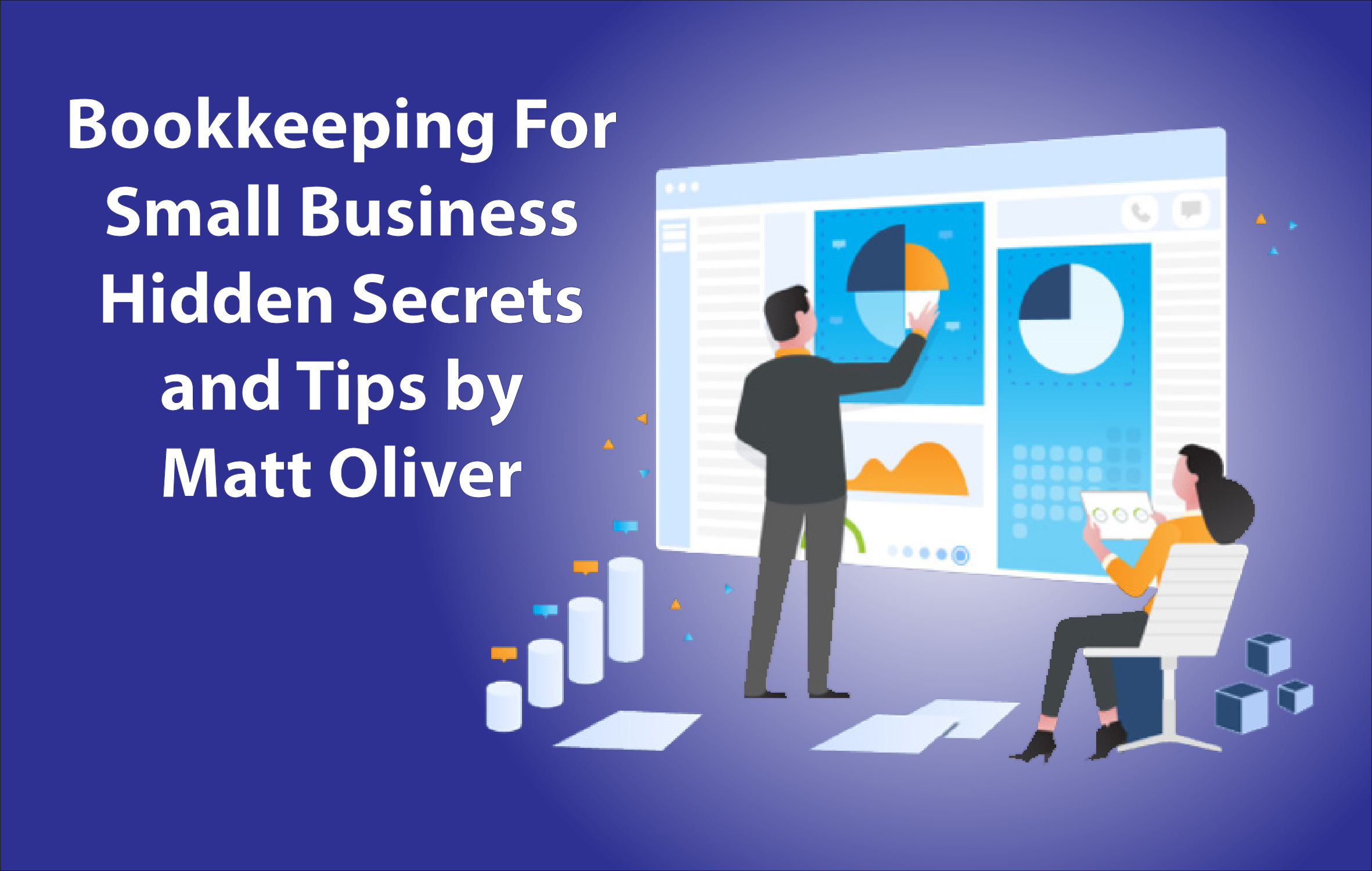Bookkeeping For Small Business Hidden Secrets and Tips by Matt Oliver

If you’re running a small business and you’re confused about the differences between accounting and bookkeeping, you’re not alone. Many entrepreneurs have similar concerns about how to record and analyze their financial information, but they don’t know where to begin. If you’re not sure how to get started, consider these five tips to streamline your accounting process. Matt Oliver, the author of Bookkeeping For Small Business, has a clear explanation of these differences and how to best use them.
Bookkeeping for Small Business
A blog post by Matt Oliver called “Bookkeeping for small business: Hidden Secrets and Tips” gives readers a wealth of information. Typically, bookkeeping is a tedious task that takes at least four hours a week. However, doing so is unwise and unnecessary as this time could be better spent on other, more valuable tasks. By breaking down the steps involved in bookkeeping, readers will discover how to achieve a happy and profitable bookkeeping process.
There are several types of accounting that a bookkeeper must perform each month. Whether a business uses a cash or accrual basis is dependent upon the nature of its business. Manufacturing companies should use the accrual basis, while those that sell goods should use the cash basis. Cash basis accounting is useful for companies that need to conserve cash. However, it is important to know which type of accounting your business uses.
The most common method is cash-based accounting. In this system, income is recorded when it is received, while expenses are recorded when money is earned or spent. This method is helpful in understanding your business over a long period of time and is especially useful for educating investors or making quick scaling decisions. If you need to know more, you can find a book on small business accounting by Matt Oliver. You won’t believe all the information inside the book!
Business Secrets for Small Scale Business
If you want to run a successful small-scale business, you should know the secrets of profitability. This article will highlight the most crucial factors that determine the profitability of your business. Managing your expenses is also essential since it will determine whether or not your business will be able to sustain itself. You should also understand the importance of cash-basis accounting. Cash-basis accounting is used when cash is exchanged for goods and services. Accrual accounting, on the other hand, records expenses and income as they happen. The method of accounting you choose should depend on the nature of your business.
Meaning of Accounting for A Company
The meaning accounting for a company is the process of preparing financial statements for a business. There are several different types of accounting, but they all work towards the same goal – to make documents about financial transactions, and analyze the financial status of a firm. Today, many people use computers for bookkeeping. In addition to traditional accounting software, there are various computer applications available to help in accounting. Read on to learn more about these programs and how to use them effectively.
One of the primary benefits of accounting is keeping track of money for a business. By doing this, a business can determine how profitable it is and evaluate how well it is performing. Accounting also keeps track of assets, liabilities, equity, revenue, and expenditures. These numbers allow a business to determine its net worth and can help it plan for expenses. This makes it essential for business success. In today’s competitive business world, keeping track of financial information is vital.
Hidden Secrets of Small Business Accounting
The book, Small Business Accounting Hidden Secrets, by Matt Oliver, is a great resource for anyone who wants to learn how to do their own bookkeeping. It covers many facets of the tax code, including the federal tax code and how to utilize payroll and property depreciation. The book also includes several tricks of the trade, including ways to make sure that you don’t overspend on business expenses. This book can help you avoid pitfalls that could result in unnecessary costs and wasted time.
First, bookkeeping is a challenging process. It can be taxing, time-consuming, and stressful. Luckily, bookkeeping professionals are available to help you through this process. Keeping track of the financial condition of your business can help you understand where you’re at financially and what you need to do to improve it. If you’re worried that your profits are slipping, this guide can help you create accurate charts and make the necessary adjustments.
You Need To Choose The Right Bookkeeping Software
Before choosing bookkeeping software, it’s important to understand what your specific needs are. While many small businesses only have basic needs, those that are global in scope may need a different package than those that are US-only. Choosing a software package that can grow with your business is essential. This article will help you choose the best software for your needs. Also, consider your budget when evaluating various options.
Xero is a cloud-based accounting platform that allows you to receive financial performance reports. It connects with your bank accounts and partners with Gusto to offer payroll services. However, it doesn’t offer live customer support. If you’re always on the go, Xero is ideal. It offers mobile access to business functions, including invoices, receipts, and inventory management. Plus, it lets you share information between multiple users.
Some bookkeeping software has advanced features that can help you manage your bank accounts. For example, some applications offer the ability to consolidate income and expenditure, while others have a Profit and Loss report. Ultimately, you must decide what features you need for your specific business. Luckily, there are several affordable and powerful bookkeeping software options for small businesses. Just make sure you find the right software for your needs and budget.
Understand and Select Accounting Method For Busine
As a small business owner, it is vital to understand and select the right accounting method for your business. The way you account for your business’s finances will determine your tax liability and ability to obtain a loan. It is also important to understand how the accounting method will impact your business’s future finances. Fortunately, understanding the differences between both isn’t difficult. If you’re interested in learning more, keep reading.
While most small businesses use cash accounting, it’s important to understand the differences between these two systems. Cash accounting provides a beautiful view of your cash flow, but it is not appropriate for larger businesses. On the other hand, accrual accounting creates more informative reports for larger businesses. Whether you choose accrual or cash accounting is entirely up to you. There are pros and cons to both. To choose the best method, talk to your accountant.
Different accounting methods can result in different tax implications. Cash accounting records revenues and expenses as they are earned, while accrual methods record them when they are paid. It’s important to remember that tax rules may require you to use the accrual method when accounting for inventory. Some small businesses use the accrual method for inventory while using cash accounts for everything else. There are also legal requirements regarding the way you record your expenses. However, the best way to understand the differences between the two methods is to choose a professional to perform your accounting needs.
Accrual Based Accounting
When deciding whether to use a cash or accrual accounting system, it is important to understand how each type of accounting method will affect the profitability of your business. In an accrual method, you record revenue and expenses immediately after they occur, such as when a client orders a product or service and the invoice is sent. In contrast, cash-based accounting requires you to wait until you receive cash before recording an expense.
While cash-based accounting records all revenue in the first period, it does not record anything for the following five years. This can result in vastly different numbers in two consecutive reporting periods. In contrast, accrual-based accounting spreads revenue over the life of a subscription, which smooths out the impact of a single transaction. For this reason, it is often recommended for businesses that sell a product or service on credit.
While the accrual method produces a more comprehensive financial picture, it has many disadvantages as well. It requires more complex bookkeeping and increases complexity. Additionally, it does not provide a clear picture of cash flow. It can lead to higher taxes, as you’ll be paying taxes on the income you did not earn. If you need a financial overview of your business, you should consider hiring a professional accountant to help you with the bookkeeping.
Cash Basis Accounting
Whether you’re a small business owner or you’re looking for a more cost-effective accounting method, cash basis accounting has its advantages. Small businesses often lack the inventory needed for accrual accounting, so this method is a good option for them. Not only does it provide a more accurate picture of cash on hand, but it’s also easy to understand. Here are some of the benefits of cash basis accounting:
One of the main benefits of cash basis accounting is that it’s simpler to do than accrual accounting. It’s also easier to track cash flow since you’re recording income when it comes in instead of when it’s paid. In addition to keeping track of revenue and expenses, cash basis accounting also helps you leverage tax strategies. You’ll also be able to get an idea of how much money is in your business at any given time.
One of the biggest disadvantages of cash basis accounting is that it requires you to pay taxes on income that you’ve yet to receive. With accrual accounting, sales are taxed in the year they were made even if you haven’t received the cash until several weeks or months later. However, this type of accounting method is still the most suitable for small businesses, especially those without inventory. However, if your business is going to grow in the future, you should start with the cash method.




![2022 Should Pay Attention To Altcoin [Opinion]](https://mindmyfeed.com/wp-content/uploads/2022/04/Untitled-1-01-1-768x507.jpg)

